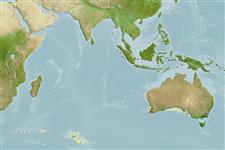Elasmobranchii (sharks and rays) >
Orectolobiformes (Carpet sharks) >
Parascylliidae (Collared carpet sharks)
Etymology: Parascyllium: para (Gr.), near, i.e., presumed to be related to Scyliorhinus (now in Scyliorhinidae): skylion, Greek for dogfish or small shark (See ETYFish); sparsimaculatum: sparsus (L.), sparse or few; maculatum (L.), spotted, referring to relatively larger (and hence fewer) spots than congeners (See ETYFish).
More on authors: Goto & Last.
Environment: milieu / climate zone / depth range / distribution range
Ecology
Marine; bathydemersal; depth range 204 - 245 m (Ref. 41629). Deep-water
Eastern Indian Ocean: Western Australia.
Size / Weight / Age
Maturity: Lm ? range ? - ? cm
Max length : 78.1 cm TL (female)
Short description
Identification keys | Morphology | Morphometrics
Vertebrae: 45 - 46. Body yellowish-brown with relatively few, large, diffuse-edged, rusty-brown spots; collar-like saddle over gill region extremely faint. Head relatively large (length greater than 16% TL). Eyes large (horizontal diameter >11% HL). Pectoral fin large, anterior margin at least 10% TL. Dorsal fins relatively tall, erect with angular apices. Upper jaw with 43-49 teeth rows. Differs from P. ferrugineum and the more heavily spotted "P. multimaculatum" morph by having a larger eye (versus <11% HL); slightly more than tooth rows (versus 38-41); fewer and much paler spots on the body ; and more erect and angular dorsal fins (Ref. 41629).
Species is likely to occur deeper, 245-435. Oviparous (Ref. 50449).
Life cycle and mating behavior
Maturity | Reproduction | Spawning | Eggs | Fecundity | Larvae
Oviparous, paired eggs are laid. Embryos feed solely on yolk (Ref. 50449).
Goto, T. and P.R. Last, 2002. A new parascylliid species, Parascyllium sparsimaculatum, from Western Australia (Elasmobranchii: Orectolobiformes). Ichthyol. Res. 49(1):15-20. (Ref. 41629)
IUCN Red List Status (Ref. 130435: Version 2024-1)
Threat to humans
Harmless
Human uses
Tools
Special reports
Download XML
Internet sources
Estimates based on models
Preferred temperature (Ref.
123201): 13.5 - 17.3, mean 16 °C (based on 7 cells).
Phylogenetic diversity index (Ref.
82804): PD
50 = 0.5352 [Uniqueness, from 0.5 = low to 2.0 = high].
Bayesian length-weight: a=0.00389 (0.00180 - 0.00842), b=3.12 (2.94 - 3.30), in cm total length, based on all LWR estimates for this body shape (Ref.
93245).
Trophic level (Ref.
69278): 3.7 ±0.6 se; based on size and trophs of closest relatives
Resilience (Ref.
120179): Low, minimum population doubling time 4.5 - 14 years (Fec assumed to be <100).
Fishing Vulnerability (Ref.
59153): Moderate to high vulnerability (51 of 100).
